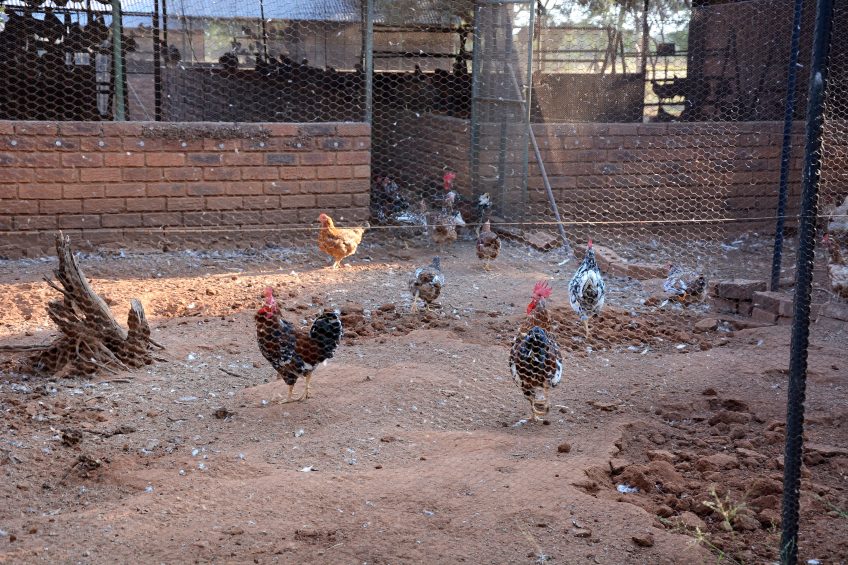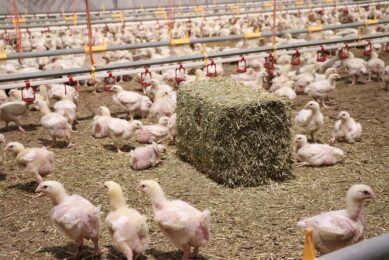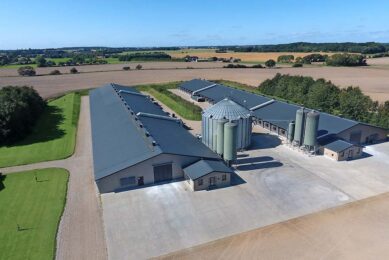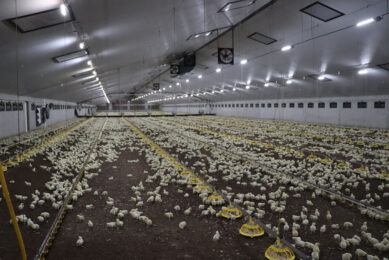Poultry crossbreed saving lives

Poultry is being hailed as the saviour for some people as it not only provides meat for consumption, the birds also produce eggs that can be sold to generate a modest income. A three way poultry crossbreed and unique free range system is saving lives in Africa.
Africa is a tough continent to farm and exist in as the harshness of the variable climate can take its toll on crops, livestock and people. Basic food requirements are scarce in many countries within Africa but thanks to the efforts of a passionate livestock breeder, things are changing for the better.
For over 20 years Mike Bosch has developed his own indigenous poultry breed that can resist the harshest climates, can thrive on relatively low feed intakes and is naturally hardy to disease. And now Mr Bosch is taking his breeding expertise to a new level by offering a free-range poultry package that can help African families survive.
Three way cross
The Boschveld breed was established by Mr Bosch after crossing three indigenous African breeds namely the Venda, Matabele and Ovambo. These breeds gave Mr Bosch the foundation on which to develop his strong Boschveld chicken which is now being sold in over 17 African countries. The birds are a very distinctive red and brown colour with white feathers in between and are the result of the cross involving 50% Venda, 25% Matabele and 25% Ovambo.
Mr Bosch, 55, was born in Zimbabwe but left the country with his parents in 1983 following security issues. He is a well-respected breeder of Beefmaster and Boran cattle but turned his hand to developing his own free-range poultry breed and is now changing lives across the continent with his efforts.

Mr Bosch set up his poultry breeding business in Bela-Bela, a town in the Limpopo Province of South Africa. The bold entrepreneur saw a niche in the market for a hardy chicken that could resist disease and endure the tough African conditions.
“The Boschveld chicken is bred purely for hardiness and health,” he says. “They survive and produce on what nature can provide, with only a small amount of maintenance feed to boost production. Africa can be a tough place to exist, particularly with varying climatic conditions, so we needed a breed that could adapt to the weather changes. Also, chickens in Africa are kept in free range conditions and need to keep producing in these conditions.”
Resistant to diseases
Disease is a major concern among poultry breeders in Africa but Mr Bosch insists the Boschveld is more resistant to diseases given its hardiness. The birds on his farm are tested every three months for bird flu and Salmonella and are vaccinated for the regular diseases such as Newcastle disease, Gumboro disease and coccidiosis. Biosecurity measures at the farm do not exist, as the Boschveld is so resilient to disease it can withstand most threats except a hungry jackal. “The cocks are strong, aggressive and have noble conformation,” Mr Bosch says. “Boschveld hens are very fertile with strong, healthy offspring that grow well. They will start producing eggs at 18 to 20 weeks of age and can produce chicks that thrive very well indeed. Cocks are ready for slaughter at 12 weeks old, depending on nutritional levels, and produce a meat with a real distinctive flavour.
We also do not trim the beaks on the Boschveld chickens as there is no need,” he adds.
He has around 50,000 hens in total on his 20 hectare farm at Bela-Bela and is very much focused on the breeding aspect of the industry. He keeps around 7,000 birds for laying and runs 100 roosters for every 600 hens. “I have around 30,000 eggs in incubators at any one time which will be hatched and sold on for breeding or laying,” says Mr Bosch. “The Boschveld hens last about two and a half years in total before needing to be replaced.”
Two eggs in three days
“The Boschvelds lay two eggs every three days on average and I receive about R13 (£0.76) per egg when selling them unhatched. I hatch eggs every week as customers want them at different stages, hatched or unhatched. Day-old chicks are making slightly higher returns at R15 (£0.88) but can be as high as R50 (£2.93) if going to West Africa.

“If I sell them at four weeks of age then I receive around R45 (£2.64) and at point of lay, which is around 18 weeks, they are sold at R100 (£5.87),” he explains. He sells birds to 17 countries within Africa and has currently embarked on another scheme to help poorer farmers become more sustainable and produce their own poultry, eggs and vegetables alongside harnessing the energy from the sun to provide an income.
Mr Bosch has set up a free-range programme that supplies small farmers or poultry keepers with a chicken coup, chickens to put in it, feed for the birds and some vegetable seeds. He will also supply some LED lights and a solar panel for the top of the coup that will produce energy to charge mobile phones via a small battery pack. It’s a programme that he says can transform the lives of thousands of Africans who are prepared to commit to the scheme. And, not only does the package provide food for the families to consume and sell, it also provides fruit and vegetable seeds that can be sown in the area the coup stood in before it was moved. This area will have been highly fertilised by the chicken manure and will grow almost anything, Mr Bosch states.
Cheap protein
“The cheapest form of protein for people is found in eggs,” he states. “We can supply a six metre by three metre cage with 16 hens which can produce 40 eggs per day for the household. Replacement birds, feed and seed are also supplied in the package along with some basic training on how to look after the birds. All the drinking and feeding equipment is included along with the solar panel, LED lights and the battery pack. This package costs around R95,000 (£5573.23) and can be delivered anywhere for an extra cost if over 300km away. The chickens fertilise the area on which the coup stands and when it is moved the people can plant the seeds there that we supply,” he says.

“We have full export accreditation for all our birds so selling this package into another African country is not a problem. Ideally we would like to sell 25 of the cages into a region so that the owners can all learn from each other and of course offset the delivery cost and revisit costs.
“Spinach, tomato and beetroot are the most common seeds that people request to sow once the chicken coup has moved, but also maize and cassava. I sold 5,000 of these systems in one year and they are becoming very popular indeed. It’s ironic that the South Africa government will not set up a support scheme for people to buy this form of food security but at the same time they are buying thousands of birds off me in a year,” he adds.
 Beheer
Beheer











 WP Admin
WP Admin  Bewerk bericht
Bewerk bericht